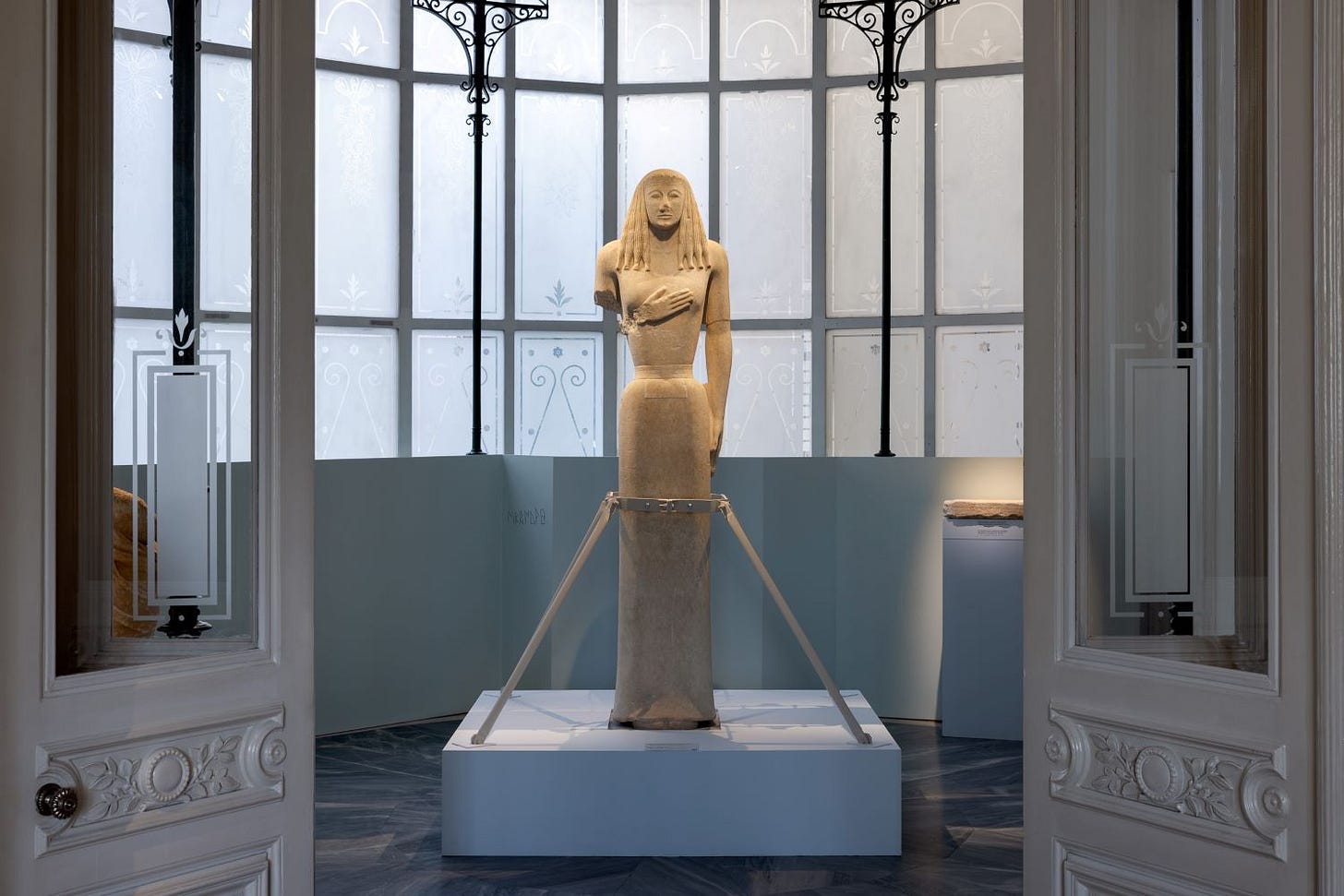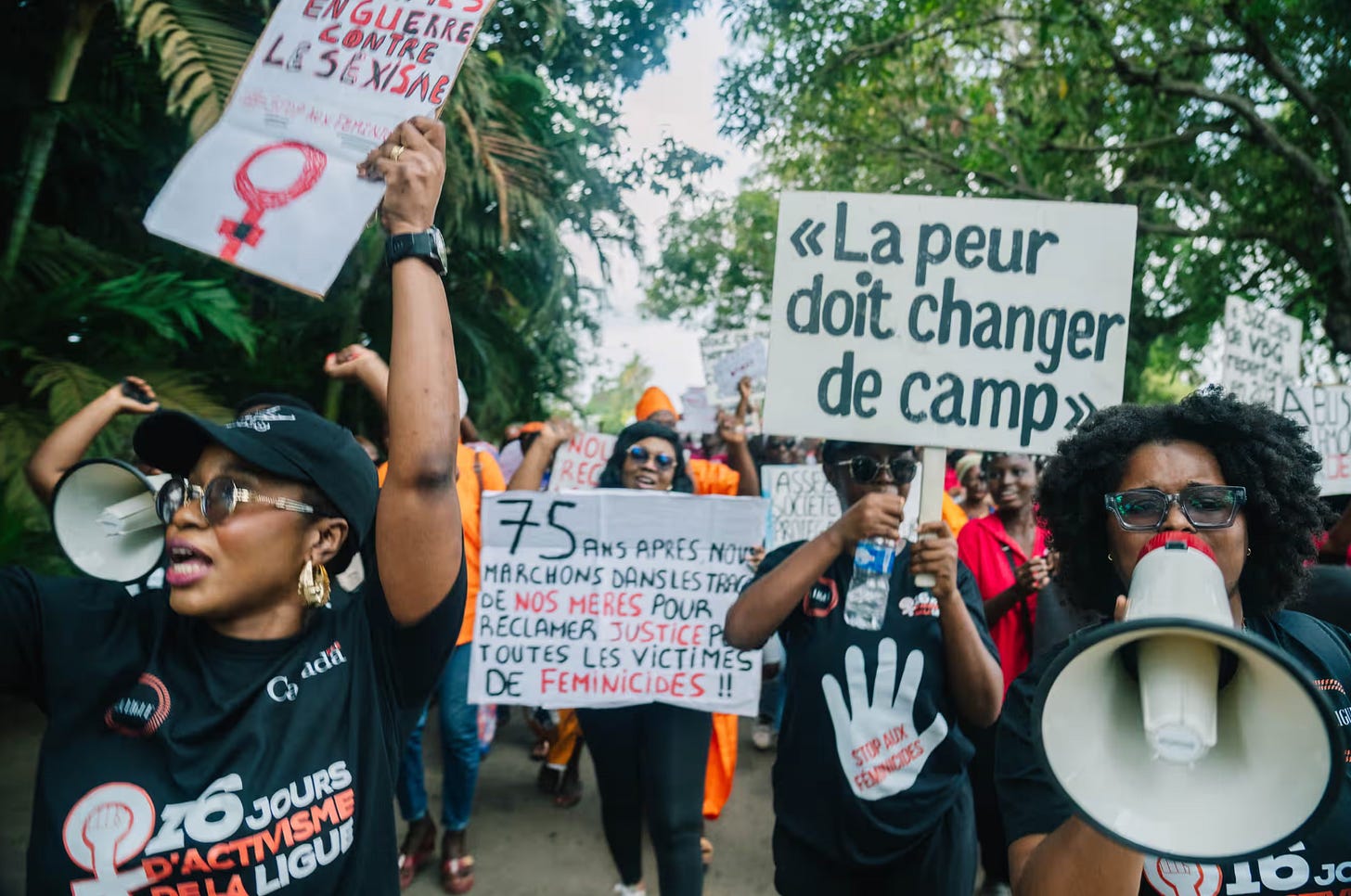“The Intersection” is your Monday, Wednesday, and Friday briefing on global affairs, business, culture, and design—offering fresh insights through the lenses of sustainable development, women-centered perspectives, and emerging global trends. The aim? To keep you informed, curious, and always ready with a compelling conversation starter at the dinner table.
Good morning! I’m still under the weather, so I spent most of yesterday indulging in self-pity, binge-watching Disclaimer on AppleTV, and reading about all the interesting things happening in Athens (random, but that is how my brain works).
The Greek capital often gets overlooked, with many quick to criticize its gritty nature. But after numerous visits, I’ve grown fond of the city. I’ve always had an affinity for large, raw urban spaces brimming with art, culture, and history—qualities Athens has in abundance. The ancient ruins of the Acropolis stand proudly as a timeless testament to classical civilization, while the lively streets of Plaka, with their neoclassical charm and café-lined sidewalks, pulse with modern energy. Athens’ café culture is as much a defining characteristic as its ancient landmarks, with both locals and visitors gathering to discuss everything from politics to art.
In recent years, the city’s contemporary art scene has flourished, with innovative galleries and creative spaces emerging in neighbourhoods like Psiri and Koukaki. The culinary scene is just as dynamic, offering everything from classic souvlaki stands to cutting-edge fine dining. With its seamless fusion of ancient history, modern creativity, and Mediterranean spirit, Athens continues to evolve while holding firmly to its storied roots.
For those visiting Greece, I’d recommend venturing beyond the crowded islands. Consider spending time on Hydra, exploring the Peloponnese (Mycenae and Epidaurus), or marveling at the monasteries of Meteora, perched atop stunning rock formations in northwestern Greece.
Until I have a chance to return to this beautiful country, you will find me reading Sappho, listening to Savina Yannatou, and eating saganaki whenever possible.
US Congress approved a short-term spending deal to keep the government running until mid-March. The measure does not include Trump's demand to lift the debt ceiling and includes funding for storm-hit states and farmers.
Women will play a key role in a new Syria, says new head of women’s affairs.
Blake Lively accuses co-start Justin Baldoni of sexual harassment and smear campaign.
Thailand hosts regional leaders in latest push to end Myanmar conflict.
Marching for Justice. In Grand-Bassam, a coastal town in Ivory Coast, women have taken a stand against the harrowing toll of femicide in their country. Over 16 days of activism, their efforts culminated in a striking march that brought nearly 200 women and girls, aged 14 to 75, onto the streets clad in orange and armed with powerful slogans. “Tired of being killed, tired of being raped,” one woman cried, while another demanded, “Protect us alive, not dead.” The campaign included various activities across the nation: forums featuring discussions and theater performances, as well as a mobile caravan raising awareness of gender-based violence in schools and communities. The marchers gathered before Grand-Bassam’s courthouse to highlight their frustration with a justice system that they believe fails to protect victims and impose meaningful penalties on perpetrators. Activists point to systemic distrust of law enforcement and lenient sentencing—murder convictions carry between 10 and 20 years in prison, while rape cases range from five to 20 years. Many cases never reach the courts, and those that do are often dismissed. The grim statistics underscore the urgency: in 2023 alone, an estimated 21,700 women in Africa lost their lives to femicide at the hands of intimate partners or relatives, according to the UN. The women of Grand-Bassam are fighting to ensure these lives are not forgotten—and to demand change that will protect future generations.
The Natural Order: Legal Rights for Rivers, Rainforests, and Waves. As environmental challenges intensify, a global movement is recognizing nature as a legal entity, with South America at its vanguard. Ecuador led the charge in 2008, enshrining the rights of nature in its constitution and setting a precedent with court decisions that often prioritize ecosystems over industry. Colombia’s Supreme Court has followed suit, granting the Amazon rainforest legal subjecthood and mandating action against deforestation. Further afield, the rights of rivers and mountains have been acknowledged—from the Ganges in India to Mount Taranaki in New Zealand. Bolivia’s sweeping declaration extends these rights to all of Mother Earth, advocating for equality among beings, whether organic or inorganic. In Brazil, a municipal ordinance grants “personhood” to a wave, affirming its right to existence, regeneration, and the uninterrupted flow of its river source. This article is well worth reading for a deeper dive into the wave’s groundbreaking legal journey and its implications for environmental stewardship.
This trend underscores a profound shift: recognizing that protecting the natural world also safeguards humanity’s future. For me, this movement is a powerful reminder that our relationship with nature must evolve from exploitation to stewardship. It’s a bold, innovative way to ensure that environmental protection is legally embedded in our societal structures.
What do you think—could this model work beyond South America, and might it reshape how we view our responsibility to the environment?
The Cost of Ignoring Nature. A landmark report from the Intergovernmental Science-Policy Platform on Biodiversity and Ecosystem Services (IPBES) offers a stark reminder of the price we pay for inaction: up to one-quarter of global GDP—an estimated $10tn to $25tn annually—is lost due to the failure to tackle interconnected crises spanning nature, climate, and human health. These hidden costs often stem from industries overlooking the ripple effects of their practices. Unsustainable farming, for instance, may temporarily boost yields but pollutes waterways with chemical run-off, triggering downstream health issues and economic burdens. “We pass those costs on—whether to insurance companies or to marginalised communities bearing the brunt of pollution and malnutrition,” says Pam McElwee, a co-author of the report.
The findings underscore an urgent need for businesses and policymakers to adopt integrated approaches that factor in trade-offs and embrace systemic solutions. The report highlights over 150 case studies demonstrating how aligning biodiversity, climate, water, health, and food systems can yield shared benefits. With global progress on biodiversity, pollution, and climate action faltering, this study is a timely call to reassess how we account for the true costs—and consequences—of doing business.

Cycladic Women: Stories Unearthed. One of my favorite museums, Athens’ Museum of Cycladic Art, has unveiled a stunning new exhibition, Kykladitisses: Untold Stories of Women in the Cyclades. (For those unfamiliar, the Cyclades are a group of islands in the southwestern Aegean Sea, comprising around 30 islands and numerous rocky islets.) This archaeological showcase features 150 artefacts, tracing the evolving roles of Cycladic women from antiquity to the 19th century. From goddesses and priestesses to mothers and merchants, the exhibition explores the multifaceted lives of women in these island societies. Historically, their stories have been told through the lens of the men of their time, but Kykladitisses seeks to uncover these women’s untold narratives—both material and whispered through history. On display until May 4, 2025, the exhibition paints a vivid portrait of the women who shaped the Cyclades’ rich cultural legacy. If you’re lucky enough to be in Athens before then, please let me know what it’s like—I’d love to experience it through your eyes!
Crafting Conscious US Luxury. Lindquist, a brand based in Providence, Rhode Island, is redefining ethical US fashion with its bags, crafted by a team earning competitive wages and full benefits. Each piece is made from high-quality, vegetable-tanned leather, free from toxic dyes and waste. What sets Lindquist apart is its commitment to transparency: every employee, from customer service to design, works on the factory floor, with their initials sewn into each bag as a testament to the hands that shaped it. Founder Lindy McDonough envisions a future where quality craftsmanship, akin to luxury brands, is available at fair prices, creating a thoughtful, small-scale fashion industry that considers the full environmental and social picture. The bags themselves are a study in understated elegance, available in shapes that range from sleek to functional, with colours such as turquoise, persimmon, and indigo adding a pop of personality. I am just so excited to see the emergence of incredible, ethically-made US brands, and I will never stop writing about them.
“We thought if we make a beautiful thing and treat people well, it will work.” - Lindy McDonough founder of Lindquist via this interview.

Lindquist: ethical, US-made bags via Vogue A Social Housing Model That Works. In the often fraught world of US public housing, Montgomery County, Maryland, is quietly rewriting how it should be done. Long committed to affordable housing, the county mandates that at least 15 percent of units in new developments cater to those earning less than two-thirds of the median income. However, what truly sets Montgomery County apart is its innovative approach to funding and ownership. The county sets aside a fund to finance and develop housing projects, allowing the county to become the majority owner, even when partnering with private developers. This model helps to circumvent the chronic underfunding and subsidy dependence that plagues many US public housing initiatives. Moreover, Montgomery’s embrace of mixed-income housing is proving transformative. By blending renters from diverse economic backgrounds, the county fosters inclusivity and mitigates the pitfalls of concentrated poverty. Profits from market-rate units help subsidize affordable housing, ensuring financial sustainability and proper upkeep of the properties. It’s a pragmatic solution that makes sense—an approach that more jurisdictions might do well to emulate.

Art Meets Ice: Fragile Beauty. After finishing A Woman in the Polar Night by Christiane Ritter last week, I was struck by the parallels in the work of Tucson-based conceptual artist Patricia Carr Morgan. Over the past decade, Morgan has turned her lens toward the fragile glacial landscapes of Antarctica and Greenland. What began as a tentative journey—much like Ritter’s—evolved into a profound connection with these icy, remote environments. Through her series I love you don’t leave me, Morgan explores themes of beauty, impermanence, and the stark realities of climate change, forging a poignant tribute to the glaciers she documents. Her work is a reminder of both nature’s grandeur and its fragility in the face of a warming world.
Over the years and across mediums, I’ve approached portraying these glacial landscapes like dear friends, and I hope this personal sense of admiration and loss comes across to the viewer. - Patricia Carr Morgan via this interview.
Martha's Blog. I recently discovered that in addition to her myriad of ventures, Martha Stewart maintains a blog, which she updates nearly every day. The site’s old-school design gives it an unexpected charm, sort of like if your older neighbour had one, except it’s Martha Stewart. Recent posts offer a peek into her world, from a holiday luncheon hosted for her farm staff to planting spring bulbs and a deep dive into her beloved London Plane trees, all accompanied by an abundance of photos. It’s a glimpse into the quiet rhythms of her life, one post at a time.
Africa's Unicorns: A Billion-Dollar Question. Two new African unicorns have entered the scene: Nigeria’s Moniepoint, a fintech firm, and South Africa’s Tyme, a completely digital bank. These privately funded companies, each valued at over $1bn, signal a growing global confidence in Africa’s innovation potential. But, as this article asks, do unicorns truly matter for the continent’s wider startup ecosystem?
The ‘Voodoo renaissance’ of New Orleans. A fascinating short video about the practice of voodoo and how it connects practitioners with their ancestors through everyday rituals and spiritual reflection.
Stay curious, and let me know what you are reading/learning about in the comments.
Much love,
Jennifer
xxx










